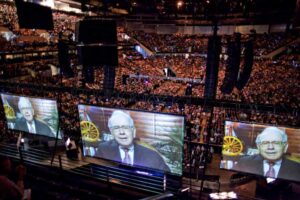
As dawn broke on Saturday, thousands had gathered outside Omaha’s CHI Health Center Arena. Some arrived before 3.30am, standing for hours in the drizzle.
This is a “once-in-a-lifetime opportunity”, said Larry Blivas, 70, near the front of the line. The realtor traveled from Los Angeles to see “an icon”, he explained.
“He’s a legend,” added Andrew Lee, 50, from New York.
The masses had not descended to catch a weathered rock star’s farewell tour, but the annual meeting of Berkshire Hathaway, a conglomerate, chaired by a nonagenarian billionaire: Warren Buffett, 93, was about to take the stage. Many of his loyal fans wonder how many more times he will appear, and what the future holds for Berkshire Hathaway – and Omaha.
They call it “Woodstock for Capitalists”. For decades, tens of thousands of moneyed investors have flocked from across the world to the Nebraskan city for a jamboree hosted by corporate America’s answer to Lennon and McCartney.
Buffett and Charlie Munger – who died last year, aged 99 – amassed a legion of followers by transforming Berkshire Hathaway from a struggling textiles manufacturer into a sprawling global conglomerate – and generating handsome returns for shareholders along the way.
His empire, which includes a manufactured-housing business accused of exploitation, and gigantic investments in fossil fuels, is not without controversy. But to his investors, Buffett and Mungers have long been heroes.
“They’ve made me a lot of money over the years,” said Blivas. Buffett, in his view, is “the greatest of all time” – and “might not be around too much longer”. When the time comes for a new generation to take charge, Blivas does not plan to turn up at 4am, as he did this weekend.
Munger’s death in November marked the end of an era, and after more than half a century, Berkshire is steeling disciples for the next chapter. Addressing the company’s latest annual meeting this weekend, he declared that its structure as a company, designed by Munger, “lived beyond his lifetime, and will live far beyond mine”.
Shareholders “don’t have too long to wait” before his chosen successors step up, Buffett remarked at one point during the meeting. “Generally, I feel fine,” he added hastily, “but I know a little bit about actuarial tables,” conceding he “shouldn’t be taking on any four-year employment contracts”.
Greg Abel, his chosen successor, was at his side on Saturday. “One way or another, there are more than 24 hours in his day,” Buffett told investors. “This place, if anything happened to me, it would be working extremely well the next day.”
The prospect of Berkshire without Buffett tomorrow has, nevertheless, layered an air of apprehension across Omaha today.
The firm’s shareholders diligently travel hundreds, if not, thousands, of miles to hear from the so-called sage of Omaha. Some 93% of the city’s hotel rooms are said to be booked out before each meeting, setting up one of the busiest weekends of the year for its businesses.
Whether Berkshire’s new guard will have the same star power, and pull such vast crowds – without the card-carrying capitalist icons who built it – is a worry for locals.
“The company is all about Buffett,” said Colin Duggan, who owns and runs Kitchen Table, a downtown cafe, with his wife, Jessica. “If Buffett’s not around? Yeah, we’re nervous. We’re a little nervous about it, for sure.”
